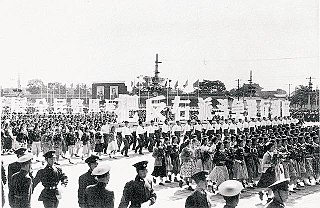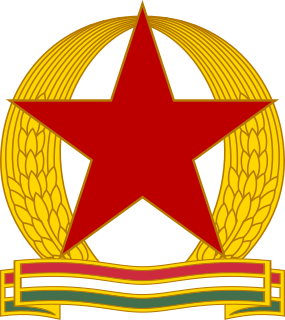 W
WThe 610 Office is, or was, a security agency in the People's Republic of China. Named for the date of its creation on June 10, 1999, it was established for the purpose of coordinating and implementing the persecution of Falun Gong. Because it is a Chinese Communist Party-led office with no formal legal mandate, it is sometimes described as an extralegal organisation. The 610 Office is the implementation arm of the Central Leading Group on Dealing with the Falun Gong (CLGDF), also known as the Central Leading Group on Dealing with Heretical Religions. In March, 2018, the office was reorganized and its functions delegated to the Central Political and Legal Affairs Commission and the Ministry of Public Security.
 W
WThe Anti-Rightist Campaign in the People's Republic of China, which lasted from 1957 to roughly 1959, was a political campaign to purge alleged "Rightists" within the Chinese Communist Party (CCP) and abroad. The campaign was launched by Chairman Mao Zedong, but Deng Xiaoping and Peng Zhen also played an important role. The Anti-Rightist Campaign significantly damaged democracy in China and turned the country into a de facto one-party state.
 W
WThe Campaign to Suppress Counterrevolutionaries was the first political campaign launched by the People's Republic of China designed to eradicate opposition elements, especially former Kuomintang (KMT) functionaries accused of trying to undermine the new Communist government. It began in March 1950 when the Central Committee of the Communist Party of China issued the Directive on elimination of bandits and establishment of revolutionary new order, and ended in 1953.
 W
WThe term enemy of the people or enemy of the nation, is a designation for the political or class opponents of the subgroup in power within a larger group. The term implies that by opposing the ruling subgroup, the "enemies" in question are acting against the larger group, for example against society as a whole. It is similar to the notion of "enemy of the state". The term originated in Roman times as Latin: hostis publicus, typically translated into English as the "public enemy". The term in its "enemy of the people" form has been used for centuries in literature.
 W
WThe Russian Imperial Romanov family were shot and bayoneted to death by Bolshevik revolutionaries under Yakov Yurovsky on the orders of the Ural Regional Soviet in Yekaterinburg on the night of 16–17 July 1918. Also murdered that night were retainers who had accompanied them, notably Eugene Botkin, Anna Demidova, Alexei Trupp, and Ivan Kharitonov. The bodies were taken to the Koptyaki forest, where they were stripped, buried, and mutilated with grenades to prevent identification.
 W
WIn 1937 an Islamic rebellion broke out in southern Xinjiang. The rebels were 1,500 Uighur Muslims led by Kichik Akhund, who was tacitly aided by the 36th Division, against the pro-Soviet provincial forces of the puppet Sheng Shicai.
 W
WKurapaty is a wooded area on the outskirts of Minsk, Belarus, in which a vast number of people were executed between 1937 and 1941 during the Great Purge by the Soviet secret police, the NKVD.
 W
WThe Land Reform Movement, also known by the Chinese abbreviation Tǔgǎi (土改), was a campaign by the Chinese Communist Party (CCP) leader Mao Zedong during the late phase of the Chinese Civil War and the early People's Republic of China. The campaign involved the mass murder of landlords by tenants and land redistribution to the peasantry. The estimated number of casualties of the movement ranges from hundreds of thousands to millions. In terms of the CCP's evaluation, Zhou Enlai estimated 830,000 had been killed and Mao Zedong estimated as many as 2 to 3 million were killed.
 W
WNandigram Violence was violence occurred in Nandigram, East Midnapore, West Bengal, India, in 2007 due to the land acquisition for a project by the Government of West Bengal led by the Communist Party of India (Marxist) to create special economic zone (SEZ). The policy led to an emergency in the region, and 14 people died in a police shooting. According to CID reports, the Nandigram violence saw a Maoist insurgency in the area during the protests. But West Bengal Home Secretary himself stated that the presence of Maoists could not be confirmed in Nandigram. The Central Bureau of Investigation later exonerated the Buddhadeb Bhattacharya government of responsibility for the shootings. But supporting the violence in Nandigram by his own party workers, Buddhadeb Bhattacharya had said earlier "They have been paid back in the same coin."
 W
WThe Naxalite–Maoist insurgency, officially referred to as the Left Wing Extremism (LWE), is an ongoing conflict between Maoist groups known as Naxalites or Naxals; a group of far-left radical communists, supportive of Maoist political sentiment and ideology, and the Indian government. Influence zone of LWE is called the Red corridor, which has been steadily declining in terms of geographical coverage and number of violent incidences, and in 2021 it was confined to 25 "most affected" and 70 "total affected" districts across 10 states in two coal rich, remote, forested hilly clusters in and around Dandakaranya-Chhattisgarh-Odisha region and tri-junction area of Jharkhand-Bihar and-West Bengal. The Naxalites have frequently targeted tribal, police and government workers in what they say is a fight for improved land rights and more jobs for neglected agricultural laborer and the poor.
 W
WThe occupation of the Baltic states involved the military occupation of the three Baltic states—Estonia, Latvia and Lithuania—by the Soviet Union under the auspices of the Molotov–Ribbentrop Pact signed 23 August 1939. They were then annexed into the Soviet Union as constituent republics in August 1940, though most Western powers and nations never recognised their incorporation. On 22 June 1941, Nazi Germany attacked the Soviet Union and within weeks occupied the Baltic territories. In July 1941, the Third Reich incorporated the Baltic territory into its Reichskommissariat Ostland. As a result of the Red Army's Baltic Offensive of 1944, the Soviet Union recaptured most of the Baltic states and trapped the remaining German forces in the Courland pocket until their formal surrender in May 1945.
 W
WThe persecution of Falun Gong is the antireligious campaign initiated in 1999 by the Chinese Communist Party (CCP) to eliminate the spiritual practice of Falun Gong in China, maintaining a doctrine of state atheism. It is characterized by a multifaceted propaganda campaign, a program of enforced ideological conversion and re-education and reportedly a variety of extralegal coercive measures such as arbitrary arrests, forced labor and physical torture, sometimes resulting in death.
 W
WThe Red Terror in Spain is the name given by historians to various acts of violence committed from 1936 until the end of the Spanish Civil War by sections of nearly all the leftist groups. News of the rightist military uprising in July 1936 allegedly unleashed a politicidal response, and no Republican controlled region escaped systematic and anticlerical violence, although it was minimal in the Basque Country. The violence consisted of the killing of tens of thousands of people, attacks on the Spanish nobility, business owners, industrialists, and politicians and supporters of the conservative parties, as well as the desecration and burning of monasteries, convents, and churches.
 W
WThe Sainbari Murder occurred in 1970 in the house of Sain family in Bardhaman in West Bengal in India, where several people were killed.
 W
WThe State Protection Authority was the secret police of the People's Republic of Hungary from 1945 until 1956. It was conceived as an external appendage of the Soviet Union's secret police forces and gained an indigenous reputation for brutality during a series of purges beginning in 1948, intensifying in 1949 and ending in 1953. In 1953 Joseph Stalin died, and Imre Nagy was appointed Prime Minister of Hungary. Under Nagy's first government from 1953 to 1955, the ÁVH was gradually reined in.
 W
WThe Xinjiang internment camps, officially called vocational education and training centers by the government of China, are internment camps operated by the government of the Xinjiang Uygur Autonomous Region and its Chinese Communist Party (CCP) provincial committee. Human Rights Watch says that they have been used to indoctrinate Uyghurs and other Muslims since 2017 as part of a "people's war on terror", a policy announced in 2014. The camps have been criticized for alleged human rights abuses, including mistreatment, rape, and torture, by the governments of many countries and human rights organizations, with some of them alleging Uyghur genocide. The governments of some countries have expressed support for China's government by denying the allegations of genocide and justifying the existence of the camps.